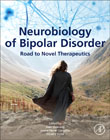
The Neurobiology of Bipolar Disorder: Road to Novel Therapeutics
Quevedo, Joao Luciano de
Carvalho, Andre Ferrer
Vieta i Pascual, Eduard
Bipolar disorder is a heterogeneous phenotype, and new frameworks such as the NIMH Research Domain Criteria (RDoC) may provide a more accurate, biologically based comprehension of the symptomatic heterogeneity of this devastating illness, and certain symptomatic clusters may be promising targets for novel therapeutics, such as drug and psychological treatments for the management of the cognitive impairments that can encompass several domains and contribute to psychosocial function, and that can persist for many patients even in periods of symptomatic remission. Neurobiology of Bipolar combines the basic neurobiology of bipolar disorder with discussion of the most recent advances in research, including the interacting pathways implicated in the pathophysiology of bipolar disorder, genetic approaches, and the pharmacogenomics of bipolar disorder. The basic foundational understanding of the neurobiology underlying the disorder, as well as the comprehensive summary of the most recent advances in research, combine to aid advanced students and researchers in their understanding of bipolar disorder and change the landscape of the management of the disorder with the development of novel and fast-acting pharmaceutical and neuromodulatory approaches. Aids readers in understanding bipolar disorder in the context of NIMH Research Domain Criteria (RDoC) recommendationsCovers range of existing and potential pharmacologic and non-pharmacologic treatment options, from lifestyle adjustments to novel therapeuticsSynthesizes discussion of cellular and molecular mechanisms underlying symptoms with clinical aspects of bipolar disorder for a thorough understanding of the disorder INDICE: 1. Tackling the heterogeneity of bipolar disorder in the era of the Research Domain Criteria (RDoC) 2. The neurodevelopmental basis of Bipolar Disorder: Mechanisms and Implications 3. The neuroprogressive nature of Bipolar Disorder: Mechanisms and Implications 4. Immune mechanisms in Bipolar Disorder: evidence and implications 5. Mitochondrial pathways in Bipolar Disorder: mechanisms and implications 6. Neuro-oxidative and neuro-nitrosative mechanisms in bipolar disorder: evidence and implications 7. Mechanisms underpinning neurocognitive dysfunction in bipolar disorder 8. The evolution of animal models for bipolar disorder 9. Alteration in Circadian rhythms in bipolar disorder: mechanisms and implications 10. The genetics of bipolar disorder 11. Pharmacogenomics of bipolar disorder 12. Blood-brain barrier dysfunction as a pathophysiological mechanism of bipolar disorder 13. Induced Pluripotent stem cells as tools for the investigation of the neurobiology of bipolar disorder 14. Bipolar disorder as a gliopathy 15. Molecular Imaging findings in Bipolar disorder 16. Structural and functional neuroimaging findings in bipolar disorder 17. Epigenetic mechanisms of bipolar disorder 18. Bipolar disorder and cardiovascular dysfunction: mechanisms and implications 19. At-risk mental states for bipolar disorder 20. Stress, allostatic load and bipolar disorder: mechanisms and implications 21. Bipolar disorder, obesity and metabolic disturbances: mechanisms and implications 22. The gut-brain axis in bipolar disorder 23. The hypothalamic-pituitary-adrenal axis in bipolar disorder 24. Disturbed neuroplasticity pathways in bipolar disorder: mechanisms and implications 25. Aberrations in intracellular signaling pathways in bipolar disorder 26. The impact of early-life stress in the development and course of bipolar disorder: mechanisms and implications 27. Bipolar disorder and accelerated aging: mechanisms and implications 28. Suicidal behaviors in bipolar disorder 29. Pediatric bipolar disorder 30. Late-life bipolar disorder 31. Biomarkers for Bipolar Disorder 32. The mechanisms of action of lithium in bipolar disorder 33. Is there a biosignature for lithium response in bipolar disorder? Evidence and implications 34. Exercise as a treatment for bipolar disorder 35. Non-invasive neuromodulatory approaches for bipolar disorder 36. Novel therapeutic drug targets for bipolar disorder 37. The treatment of bipolar disorder in the era of precision psychiatry: challenges and opportunities
- ISBN: 978-0-12-819182-8
- Editorial: Academic Press
- Encuadernacion: Rústica
- Páginas: 450
- Fecha Publicación: 01/11/2020
- Nº Volúmenes: 1
- Idioma: Inglés
